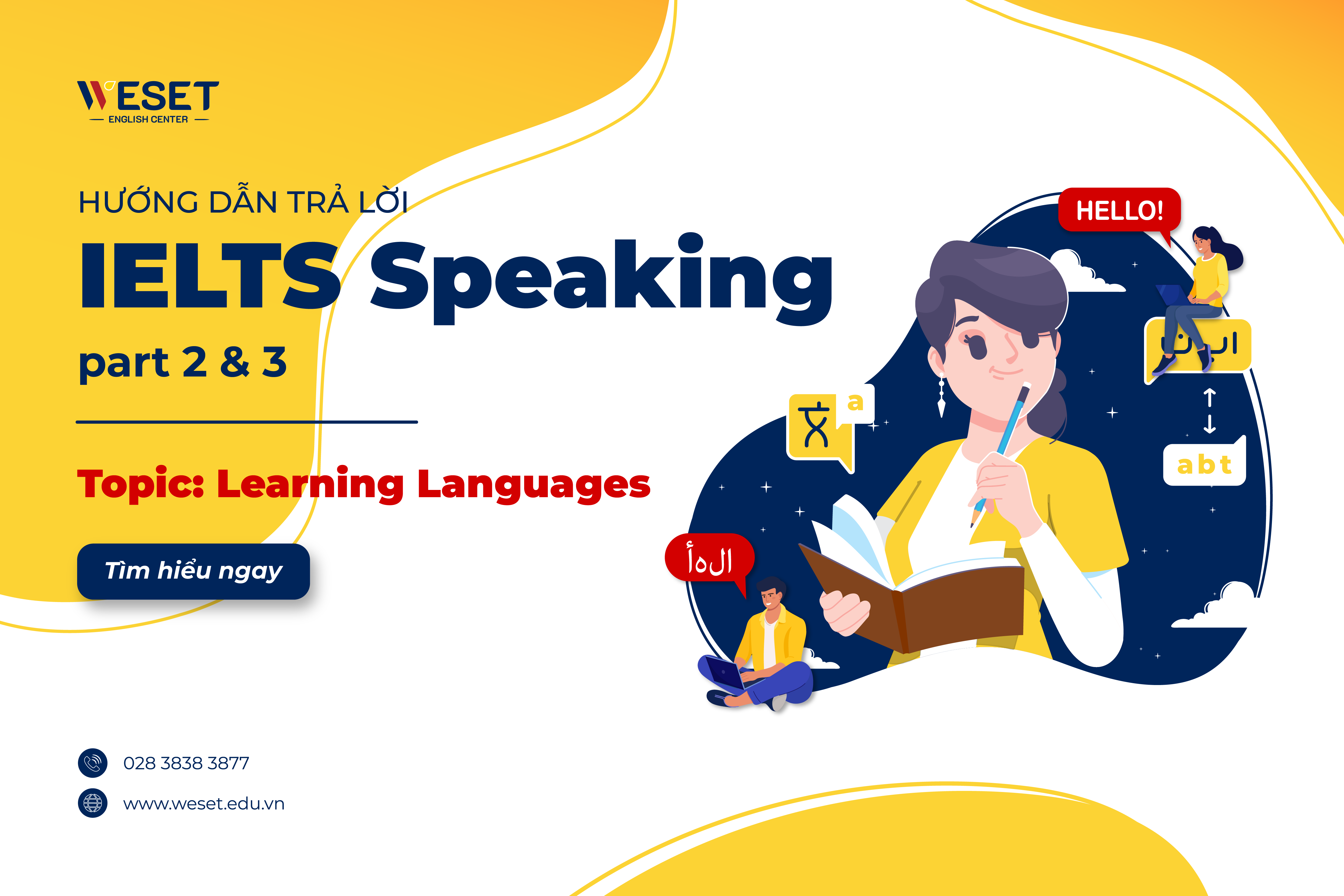Trang chủ Blog Bài thi IELTS mẫu Learning Languages IELTS Speaking – Sample part 2 & 3
Learning Languages IELTS Speaking – Sample part 2 & 3
- Hoang Anh
- Bài mẫu IELTS Sample Speaking, Bài thi IELTS mẫu
MỤC LỤC

Chủ đề Languages – Ngôn ngữ vẫn luôn là chủ đề thông dụng khi thi IELTS Speaking. Vì vậy, trong series bài mẫu theo chủ đề lần này, WESET mang đến cho bạn topic Languages với câu hỏi kèm câu trả lời cho part 2 và 3 của bài thi Speaking. Hãy cùng WESET xem qua bài mẫu và học thêm từ vựng liên quan tới chủ đề bạn nhé!
Languages IELTS Speaking – part 2
Question:
Describe a thing you did to learn another language.
You should say:
- What language you learned
- What you did
- How it helped you learn the language
- And how you felt about it
Answer:
Language is a kind of communication that individuals employ to exchange thoughts, feelings, and information with one another. Today, in the era of globalization has highlighted that English is among the most commonly spoken languages in the world. In casual as well as formal settings, it is also very popular as a second language. Therefore, studying a foreign language is very beneficial and necessary in the Vietnamese context, especially English.
Even though I have a constant desire to learn new languages, I found it quite difficult to master English as a young child. To be completely honest, I began learning English in sixth grade. I had no idea where to begin or how to do it at the moment. When I went to class for the first time, I felt left out when all my classmates were better than me. I felt like each day was a burden, but I persisted and worked tirelessly to improve, especially in my speaking ability, which was my biggest weakness. To broaden my vocabulary, get used to, and imitate native speakers’ accents, I watched their videos on YouTube since these videos were inspiring as well as enjoyable sources of knowledge to learn from. Moreover, I also practiced speaking English with my sister.
It was quite difficult for me to follow at first since I did not have enough language and the pace was too rapid. Before having a good grasp of the language, I had to enable subtitles and watch each video several times. I also wrote down the helpful collocations as well as new words I learned from the videos and made an effort to utilize them as frequently as I could while I practiced speaking and writing. The more I did it, the better my English became over time.
Since the themes covered by those video producers were so fascinating and educational, I actually appreciated their work and it helped me learn more about western cultures and ways of life. I have been watching influencers’ Vlogs as a hobby for a few years now, and during that time, I have picked up some slang and colloquial English that I use whenever I have the chance to interact with foreigners.
Từ vựng:
employ (v): sử dụng, dùng
globalisation (n): toàn cầu hóa
highlight (v): làm nổi bật
have no idea: không có ý tưởng, không có hướng giải quyết
feel left out: cảm thấy bị bỏ lại
persist (v): kiên trì
broaden (v): mở rộng
imitate (v): bắt chước
inspire (v): truyền cảm hứng
Have a good grasp of something (idiom): nắm vững hay biết rõ điều gì
make an effort: nổ lực, cố gắng
fascinate (a): thu hút, cuốn hút
appreciate (v): đánh giá cao
slang (n): từ lóng
colloquial (a): thuộc về hoặc thích hợp với cách nói chuyện thông thường
Languages IELTS Speaking – part 3
Question 1: How has social media affected the way people communicate with each other?
A1: The hardest challenge in learning a language, in my opinion, can be as easy as losing motivation. No matter how enthusiastic you are at first, a slump will inevitably set in. Lack of opportunities to practice the language makes it difficult to learn, which is another factor. Learning to think in another language is likewise difficult. Above all, it requires patience, effort, and devotion. Another issue is that learners rarely get the chance to use the language in a suitable setting, which is a big disadvantage in less developed nations where educational resources are frequently insufficient.
Question 2: Do you think language learning is important? Why?
A2: I reckon it is without dispute that learning languages has advantages. It is crucial because it fosters the growth of abilities like communication and cultural sensitivity. Additionally, learning a foreign language expands one’s options for employment. Cognitive growth results from language learning. Children that are bilingual or multilingual also perform better in other disciplines.
Question 3: Which is better, to study alone or to study in a group? Why?
A3: Well, this depends on personal choices, but in my opinion, studying alone is more productive for assignments that have tight deadlines. This is due to the fact that one wouldn’t have the interruptions or distractions that come with group learning. Having said that, studying with peers is also essential when working in a team to accomplish a common objective or resolve a challenging issue.
Từ vựng:
motivation (n): động lực
enthusiastic (a): nhiệt tình
slump (v): sụt giảm
likewise (adv): tương tự
devotion (n): hết lòng
reckon (v): nghĩ, suy nghĩ
foster (v): nuôi dưỡng
cognitive (a): nhận thức
bilingual (n): song ngữ
multilingual (n): đa ngôn ngữ
discipline (n): kỷ luật
accomplish (v): hoàn thành
resolve (v): giải quyết
Lời kết
Trên đây là tổng hợp bài mẫu theo chủ đề Social Media IELTS Speaking và từ vựng liên quan. Hãy thực hành thường xuyên để tự tin đạt điểm cao nhé bạn! Cũng đừng quên tham khảo thư viện bài mẫu IELTS và đăng ký nhận tin từ WESET để cập nhật các tip học tiếng Anh mới nhất nhé!






